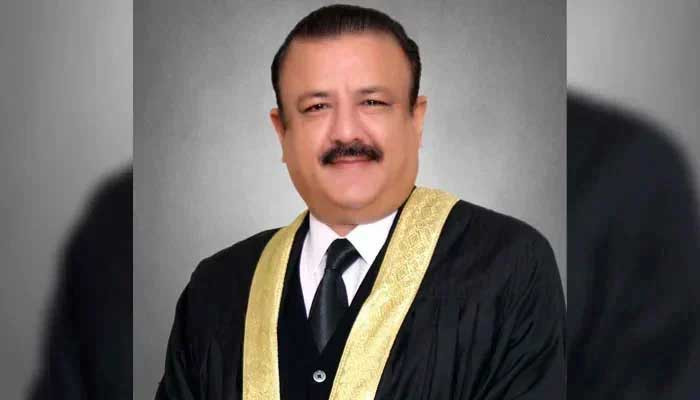Supreme Court Overturns IHC Order Against Justice Jahangiri
The Supreme Court intervened on Monday, suspending the Islamabad High Court’s (IHC) directive that prevented Justice Tariq Mehmood Jahangiri from carrying out judicial functions.
The highest court in the country has formally notified relevant parties, which include the Attorney General of Pakistan’s office, and has postponed the hearing until tomorrow.
This judgment was delivered by a five-member constitutional panel presided over by Justice Amin-ud-Din Khan, in response to an appeal submitted by Justice Jahangiri, who contested the IHC’s order issued on September 16.
Other justices on the bench were Jamal Khan Mandokhail, Muhammad Ali Mazhar, Syed Hasan Azhar Rizvi, and Shahid Bilal Hassan.
This action follows a previous IHC ruling by a two-judge panel, led by Chief Justice Sardar Muhammad Sarfraz Dogar and Justice Mohammad Azam Khan, which had earlier barred Justice Jahangiri from his judicial duties pending a decision by the Supreme Judicial Council (SJC) on a petition filed against him by lawyer Mian Dawood.
Following the initial verdict, five IHC justices, including Justice Jahangiri, independently appealed to the SC against the divisional bench’s decision.
The other four justices included Mohsin Akhtar Kiyani, Babar Sattar, Saman Rifat, and Ejaz Ishaq Khan.
The core of the case revolves around the controversy surrounding Justice Jahangiri’s LLB degree, which was recently revoked by the University of Karachi.
As per the university’s official statement on September 25, the university syndicate, during its meeting on August 31, 2024, approved “Resolution No 06” adhering to the decision of the authorized body, which supported the Unfair Means Committee’s (UFM) recommendation.
The notification further declared, “Justice Jahangiri was found to have engaged in unfair practices and is now prohibited from seeking admission to any university or college, as well as from participating in any university examination for a duration of three years.”
Furthermore, the University of Karachi clarified that Justice Jahangiri was never officially registered as a student at Islamia Law College, Karachi, in 1989.
Previously, the Sindh High Court (SHC) had suspended the University of Karachi’s Unfair Means Committee’s ruling and the syndicate’s announcement invalidating the judge’s credentials.
The petitioner had contested the UFM committee’s choice to nullify Justice Jahangiri’s degree back on August 17, 2024.
Since then, the SHC has also dismissed similar petitions regarding the judge’s degree due to lack of prosecution, in spite of concerns voiced by the defense lawyer.
The lawyer in the case questioned the validity of the bench’s determination to allocate the hearing to itself from a separate constitutional bench, which had originally planned the petitions for a hearing on September 30. As a sign of protest, the lawyers decided to boycott the proceedings following the bench’s refusal to recuse itself.
The bench articulated that both judges concurred that there were no legitimate reasons for recusal, adding that any matters pertaining to maintainability needed to be addressed first.
Furthermore, the SHC bench rejected the petitioners’ lawyer’s argument suggesting that these petitions should be reviewed by a standard SHC bench, asserting that the constitutional bench constituted the appropriate venue given the nature of the relief sought.



Comments (0)
No comments yet. Be the first to comment!
Leave a Comment